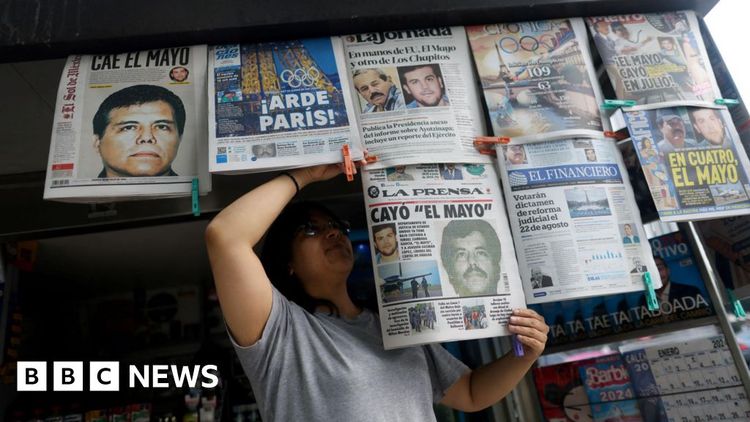Ismael 'El Mayo' Zambada: How US caught drug kingpin after 35 years

Ismael 'El Mayo' Zambada is a well-known figure in the history of the drug war, representing the strong control and harmful impact of the top drug cartel globally.
He was the final member of the first group of drug cartel bosses, and he formed the Sinaloa Cartel with Joaquin 'El Chapo' Guzman after the Guadalajara Cartel fell apart in 1989.
However, in contrast to his well-known associate who was imprisoned twice and managed to escape, El Mayo managed to avoid being captured for around 35 years. But that all changed recently.
American officials have taken him into custody in El Paso, Texas on Thursday. He has entered a plea of not guilty to numerous charges in a federal court in Texas.
He was tricked into coming to the US as part of a complicated plan, organized by the son of his ex business partner, El Chapo. Joaquin Guzman Lopez, who inherited El Chapo's criminal activities, was taken into custody with Zambada. He convinced Zambada that they were going to northern Mexico to check out potential locations for secret airstrips.
"Do you fear being apprehended?" Zambada was questioned in 2010 by the deceased Mexican reporter, Julio Scherer García, who had journeyed far into the mountains for a groundbreaking interview with the cartel leader.
The thought of being locked up terrifies me," he responded. "I'm not certain I have the strength to end my own life. I want to believe I do and that I would choose to end it myself."
But in the end, he either lacked the resources or the chance.
After being careful for many years, it's surprising that Zambada was tricked at the age of 76. Maybe it needed a truly remarkable event to finally catch him.
"I'm not shocked that Zambada didn't surrender voluntarily," Mike Vigil, a ex-DEA agent, remarks. "Given that he's in his seventies, sickly, and has already stated that jail terrifies him."
The recent arrests and potential agreement between El Chapo's sons, also known as Los Chapitos, and the US Government, raise the issue of who will assume leadership of the Sinaloa Cartel.
Following the capture and extradition of El Chapo Guzman to the United States in 2016, a series of violent conflicts erupted as different groups competed for power and territory, while also battling against rival drug organizations taking advantage of the perceived vulnerability.
Even more surprising and aggressive was the reaction of the Sinaloa Cartel's lower-ranking members when their leader, Ovidio Guzman Lopez, was taken into custody in October 2019.
Following his arrest, a large group of armed individuals made their way to Culiacan and began attacking civilians, police, and military forces using heavy weaponry. After a period of conflict, authorities decided to release Ovidio Guzman to his associates in order to quell the violence.
He was arrested again, sent to another country for trial, and is now in a prison in the United States, waiting for his court date.
Mike Vigil believes that another outbreak of violence, comparable to the Culiacanazo, could potentially be prevented this time.
"The Sinaloa Cartel has a deep roster of potential leaders who might step up, including El Chapo's sibling," he states.
According to Mr. Vigil, the approach of targeting individual cartel leaders, known as the "Kingpin strategy," is hardly ever effective.
During the time when Felipe Calderon was President of Mexico, his administration mostly caused disputes within the cartels, resulting in a violent and bloody conflict.
If the same situation occurs again, former DEA agent Mike Vigil believes that the only group to benefit would be their competitors, the Jalisco New Generation Cartel (CJNG).
However, situations like this are very uncertain and can lead to unexpected power shifts. In response, more troops have been deployed to Sinaloa by the Mexican government to prevent any potential increase in violence.
Another clear question regarding Zambada's arrest is: why has it happened at this moment?
The surgery had been scheduled for a long time. Yet, some sources suggest there was also a spontaneous aspect to it. As the different components of the plan seemed to be falling into place, even though some US officials were doubtful, they ultimately concluded they had nothing to risk by attempting it.
The main reason for the timing became clear when US Attorney General Merrick Garland explained in a video message announcing the arrests.
"Fentanyl poses the most serious danger our nation has ever encountered," he stated, vowing that the US justice department "will continue to pursue every cartel leader, participant, and accomplice who is responsible for spreading harm in our neighborhoods."
Fentanyl overdoses are currently the main reason why Americans aged 18 to 45 are dying. This shocking fact may be making the Biden administration take notice, especially with an election coming up.
Both Los Chapitos and El Mayo have accumulated vast amounts of money from fentanyl, a drug that can be easily made and moved without the use of extensive coca plantations in the Andes like those required for cocaine production.
According to specialists, completely stopping the illegal transportation of fentanyl is extremely challenging. The cartels find it highly profitable and it is deeply ingrained in the ongoing drug conflict in Mexico.
Nevertheless, the US authorities aim to combat the cartels responsible for drug production, reduce their power, and, whenever feasible, dismantle their leaders.
The arrest of El Mayo Zambada was always going to be an important part of the plan, even though he is getting older, in poor health, and was captured through deceit.











































